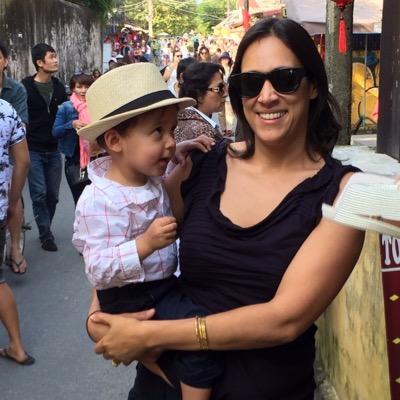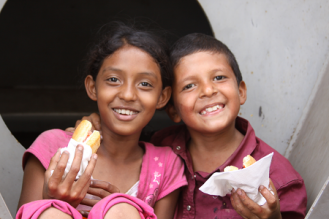The Unitarian Universalist Service Committee advances human rights through grassroots collaborations.
An Interview with Rachel Freed, Vice President and Chief Program Officer

By Carly Cronon on January 4, 2018
Carly Cronon spoke with Rachel Freed about her past work in human rights, what drew her to UUSC, and her most memorable moments with the organization thus far.
When and why did you first become involved in human rights work?
I grew up in a multicultural family and spent a lot of time visiting relatives in Southeast Asia, where I witnessed persistent inequalities and the dehumanization that went with it. It made me eager to develop my own understanding of how different political, social, economic and cultural forces shaped how and why people had certain rights over others.
Years later, a pivotal moment occurred during my junior semester abroad in India. I visited a rural fishing community that had been subject to fly ash pollution from a neighboring Exxon plant. Villagers in the community were mostly illiterate and had been told by the company that the fly ash was not harmful. In response to their concerns, the company-sponsored health clinics told villagers they were fine. This continued until a local nongovernmental organization working with a community member tested the water and found strains of harmful chemicals in the fish and streams.
Through outreach and education, the villagers organized the entire community, mobilized, and successfully demanded accountability. This experience helped me to understand the power of local communities and NGOs to catalyze vibrant and democratic social change movements.
What drew you to UUSC’s human rights work in particular?
My journey to UUSC was inspired by working with a UU congregation and community in a great struggle against injustice. When I graduated from law school, I worked for a civil rights firm in New York City, where the lead attorney humored my request to do pro bono work by connecting me to his UU congregation in Ridgewood, NJ. It was there that I met four passionate women who chose to spend their free time visiting detained asylum-seekers in detention centers. I offered to take one case, but then I started to get calls from the detention center on a daily basis.
There was one rather stark case I can remember – that of a Liberian refugee who escaped rebel forces during the reign of Charles Taylor, the former President and now convicted war criminal. After witnessing her siblings’ deaths, she fled the country and came to the United States. She lived here for almost seven years – just shy of the residency requirement to become a U.S. citizen – when a minor shoplifting incident landed her in detention, facing deportation. She had no representation, she suffered from severe post-traumatic stress disorder (PTSD), and her kids had been taken into child protective services. My UU friends began to visit her each week to connect with her children’s government rep, and to help piece together the documents in her case. Next began our three-year journey together. It was quite a trek from Brooklyn to the middle of New Jersey, but my UU friends never failed to ferry me from the commuter rail, or deliver documents and do a visitation when needed. Eventually, we found the psychologist who had treated this woman in detention; he testified about her PTSD, and we were able to win the case. She was released and reunited with her children after nearly four years of living in the detention center.
I share this story because it is about a few caring individuals and what they accomplished by offering their time and generosity and by organizing their community for a specific cause. This is what drew me, and continues to draw me, to UUSC – it is our collective approach and struggle for justice in this world—as inspired by our founders and continued onwards through the years.
What do you like most about your job?
At UUSC, we are lucky to work with some of the most remarkable human rights activists around the world – people who wake each day not quite sure of what their efforts may bring for their communities, but who continue on anyway because of their deep belief in love, equality, and humanity. We are able to draw tremendous strength and courage from our partners. I also feel incredibly fortunate to work with such talented, passionate, and committed colleagues – I learn so much from all of our staff on a daily basis.
What is one of your most cherished UUSC memories or success stories?
One of my most cherished moments occurred during my trip to Nepal a few months after the 2015 earthquake, while meeting with one of our partners focused on trauma resiliency. They were helping to train a cadre of local teachers working with rural Dalit youth who had received very little support since the earthquake. We were in a small classroom when one of the children began to break down – she had lost her mother during the earthquake and was struggling to take care of her little brother. One of the trainers immediately calmed her down, and they sat for a while, talking and focusing on her breathing and the present moment. She managed to calm down, stop crying, and soon was smiling and sharing with us her dreams for her brother and telling us about her hopes for herself. It was really moving. I felt proud to know that UUSC was able to help bring trauma resiliency skills to teachers serving Dalit children in a remote area that had been overlooked by larger recovery efforts.
What do you and your team look for in finding new UUSC partners?
UUSC’s approach is unique to most Western human rights organizations because we center the voices of communities and their values in our pursuit to advance human rights and transform unjust power structures. Our model focuses not on a community’s helplessness or lack of knowledge, but rather their assets and their solutions. Therefore, we generally look to partner with smaller, lesser-known organizations doing innovative work to transform and empower marginalized populations, often in the face of extreme and adverse circumstances. The process of selecting new partners involves working with those organizations to identify how UUSC’s financial and other resources can be best leveraged to further human rights on the ground. It also includes mapping stakeholders, identifying points of power, and thinking through how UUSC’s voice and prominence as a U.S.-based human rights organization can be used to instigate systemic change.
What is an upcoming UUSC initiative that you are particularly excited about?
I’m in the middle of packing my bags for a trip to Zagreb, Croatia to participate in a convening that brings together our partners in the Balkans who are helping to serve Syrian refugees. At this convening, our partners from Hungary, Serbia, Slovenia, Macedonia, and Croatia will be coming together to exchange information, build relationships, coordinate responses and collectively strategize on how to navigate the increasingly challenging political environments in which they operate. Our Balkans partners work in counties that have become increasingly hostile towards refugees, and their organizations are facing new government restrictions on their work. I’m excited to talk with them about their experiences and strategize ways UUSC can support their collective efforts during this critical time.
